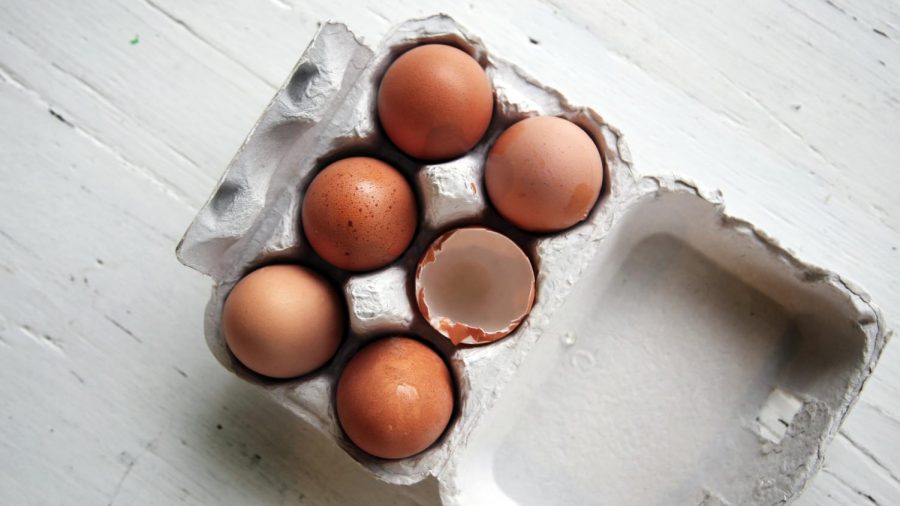Cracking Down
With an egg shortage and the remaining produce prices increasing, what is the fate of the Notre Dame cafeteria amidst this dil-egg-ma?
Scrambled. Sunny-side up. Hard-boiled. Poached. Omelet. Sous vide, if you fancy. Arguably the most versatile food, the egg is a staple of the breakfast meal. But alas, the flexible ingredient has disappeared from our grocery stores and left the remaining dozens to quadruple in price.
Due to high demand for eggs, systems of efficiency are prioritized over durability, a common trend in manufacturing. Such systems have led to massive amounts of chickens kept in one large space in order to meet demands. This, of course, has made them more vulnerable to contagious diseases because of the sheer amount of animals exposed to each other. With the spread of the avian flu, farmers have been forced to dispose of large groups of chickens at a time for fear of further contamination.
However, bird sickness is not the only reason California has been hit especially hard. With inflation already affecting gas prices, it also may be to blame for the eggs. Another factor to consider is California’s fairly new cage-free law. It required all California sold eggs to be purchased from chickens living in cage-free barns as of last year which decreased the options for grocers to obtain their eggs from.
The early months of the year are also the time for supermarkets and grocery stores to gradually rebuild their egg supply following the holiday season, when eggs are usually in high demand for baked goods. All these circumstances combined have led to the sudden increase in egg prices.
Despite this, the Notre Dame cafeteria rises above the issue and continues to dole out beloved breakfast burritos each morning undisturbed. Ms. Hanna, the Cafeteria manager and owner of Hanna-que Inc., said, “The egg shortage hasn’t affected us specifically because that was mainly hardshell eggs and we use liquid eggs.”
The egg shortage didn’t impact the cafeteria severely, but other factors have challenged the company to keep up with demands. “We work really hard to keep the prices as low as possible. But at the same time, we are an independent company that has a contract with the school and we have 25 employees to consider as well as insurance and car expenses. Right now, we are driving back and forth between our off-site kitchen and gas prices have hit us pretty hard. Hopefully once we get back in the kitchen, all those extra costs will go away and it will help us stabilize the cost,” said Hanna. The rising cost of containers for the snacks sold at the stands has made more of an impact than the lack of eggs.
The company has had to overcome various challenges especially because the cafeteria is currently under construction. With such challenges, sacrifices have to be made as well. Mr. Hanna, who works alongside Ms. Hanna, said, “With the new system that we have to work with right now, we have had to cut our menu down probably about 30% just because stuff doesn’t travel as well. Everything has to be a certain temperature.”
Students do not need to worry about any sudden increase in the cost of specials this semester despite these issues. “Prices generally go up as the years go by. Some of the specials we’ve had to adjust usually at the beginning of the school year just to help cover the rising costs,” says Ms. Hanna.
The school cafeteria has not been struggling during the egg shortage, and neither have those who chosen a rather agrarian solution to the problem.
Paisley Grutter ‘24 has been raising chickens in her backyard since she was young and it may prove to be a viable solution to combating the egg shortage. “I’ve had chickens for about a decade now. You could say I’m a seasoned chicken farmer,” she joked.
For Grutter, having chickens has provided both a source of eggs and cash flow. “We have sold eggs at one point. It was during one laying season and the hens just filled crates and crates of eggs, so we just had to sell them,” she said.
Having eggs at hand has also proven to be a money saving solution. “Just recently was maybe the first time in a long time that we’ve had to buy eggs. There’s construction going on in the backyard right now that disrupted their laying season and it also overlapped with the egg shortage. But overall, it has barely affected us because we have chickens,” said Grutter.
Grutter recommends raising chickens to those with a large backyard. She said, “Chickens aren’t that high maintenance. We have bins in the back for food and water, so we just let them roam around. It gets a bit messy because they poop everywhere, but it’s not a big deal as long as you clean up. There are many pros to raising chickens. Save some money. Make some money. Eat some eggs!”
As of now, egg prices aren’t nearly as high as they were weeks ago but we can never be short of options. Hopefully, we won’t continue to be short of eggs.





